#Ebenezer baptist church
Text

Jimmy Carter and Rosalynn Carter sing with Martin Luther King, Sr., Coretta Scott King, Andrew Young and other civil rights leader during a visit to Ebenezer Baptist Church in Atlanta
Collection JC-WHSP: White House Staff Photographers CollectionSeries: Jimmy Carter's Presidential PhotographsFile Unit: Jimmy Carter, Rosalynn Carter - At the Ebenezer Baptist Church
This color photograph shows from left to right Martin Luther King, Sr., Rosalynn Carter, Andrew Young, Coretta Scott King, President Jimmy Carter, and others holding hands while singing. In the background there are other people, an American flag, and part of a pipe organ.
183 notes
·
View notes
Text
Sen. Raphael Warnock (D-Ga.) said on Monday that he “won’t rest” until lawmakers pass national voting rights legislation, renewing his push for further reforms on Martin Luther King Jr. Day.
“Nobody’s about to silence me on this issue of voting rights,” Warnock said in an interview on MSNBC’s “Morning Joe.” “We’re going to get this done.”
In the last Congress, Democrats tried and failed to pass sweeping voting rights legislation that sought to fight back against state laws in a number of GOP states that had curtailed access to the ballot.
After the John R. Lewis Voting Rights Advancement Act passed the House in September 2021, Democrats in the Senate were unable to get the bill through the chamber because of Republican opposition.
Now Warnock, who is also the senior pastor at Atlanta’s Ebenezer Baptist Church, where King was pastor until his assassination in 1968, is pressing to get federal voting rights legislation passed, arguing on MSNBC that the issue should be at the top of his party’s agenda.
“Voting rights is not just some other issue alongside other rights,” Warnock said. “It’s the very framework in which we get to fight for all the things we care about.”
Warnock’s offensive on voting rights comes after President Biden during a speech on Sunday at Ebenezer Baptist Church on what would have been the slain civil rights icon’s 94th birthday that the U.S. is at an “inflection point” for the fight for democracy.
But with Republicans in control of the House of Representatives and Democrats holding a slim majority in the Senate, the prospects of passing sweeping voting rights legislation seem slim. Republicans have signaled instead that their legislative priorities include curtailing abortion access and repealing key parts of some of the Biden administration’s most prominent legislative victories over the last two years.
#us politics#news#the hill#2023#Sen. Raphael Warnock#Democrats#Georgia#Martin Luther King Jr. Day#dr. martin luther king jr.#martin luther king jr#voting rights legislation#John R. Lewis Voting Rights Advancement Act#us house of representatives#Republicans#us senate#Ebenezer Baptist Church#msnbc#morning joe#president joe biden#biden administration
51 notes
·
View notes
Text

0 notes
Text
I really wanted to be witty in my first post, but:
The guy that has been speaking in sentences and paragraphs to a moral audience for decades, vs the guy who finished up his campaign pondering what are pronouns ... look I don't care if you're Republican or Democrat but this really should not have been a difficult choice FOR THE UNITED STATES SENATE.
Congrats and do good work for all of us, Senator.
0 notes
Photo










The Great Atlanta fire of 1917 (21st May) caused $5.5 million in damages, destroying some 300 acres including 2,000 homes, businesses and churches, displacing about 10,000 people but leading to only one fatality (due to heart attack).
#Great Atlanta fire of 1917#21 May 1917#105th anniversary#US history#USA#travel#summer 2016#original photography#architecture#cityscape#Georgia#Atlanta#Centennial Olympic Park#tourist attraction#landmark#Martin Luther King Jr. National Historical Park#free admission#vacation#Martin Luther King Jr. Center for Nonviolent Social Change#Ebenezer Baptist Church#World of Coca Cola#Bank of America Plaza#Fountain of Rings
1 note
·
View note
Text
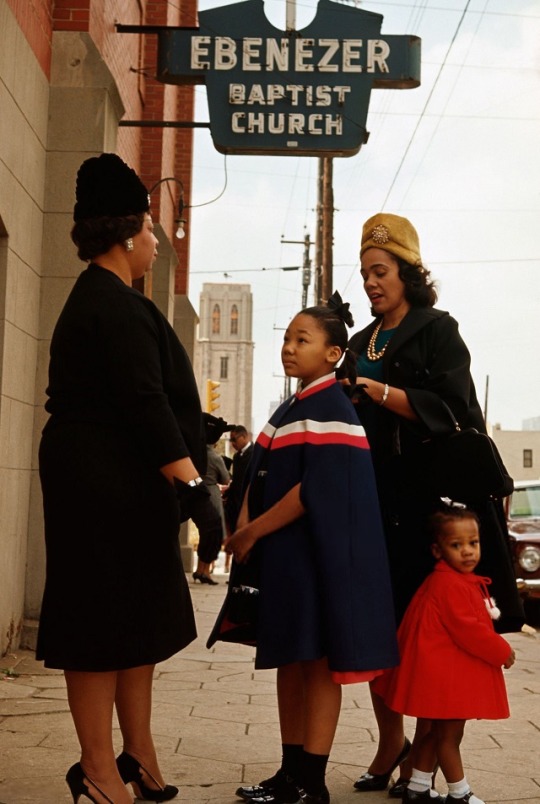
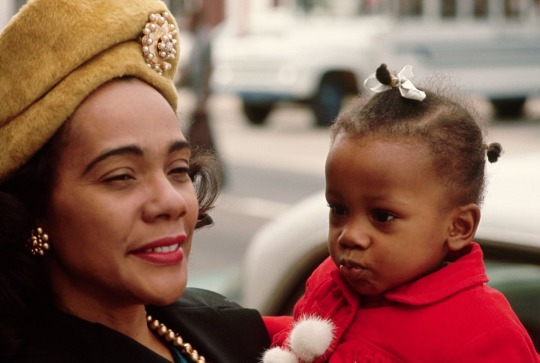

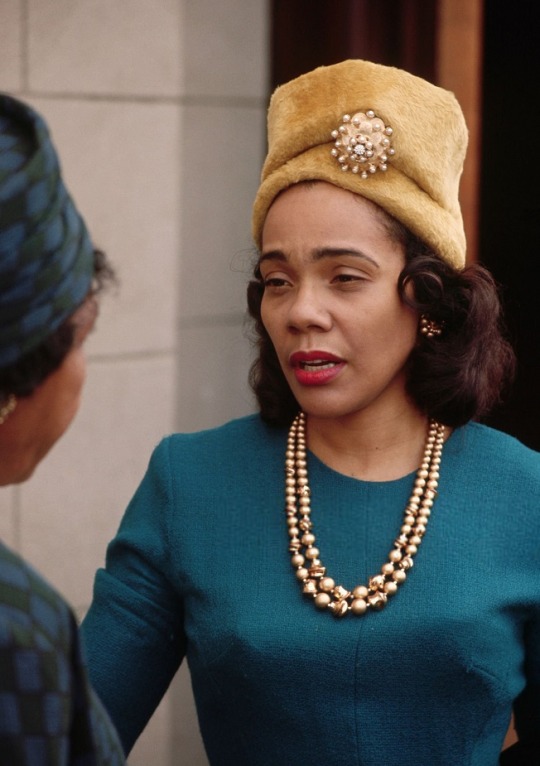
Coretta Scott King with her daughters Yolanda King and Bernice King at Ebenezer Baptist Church in Atlanta on November 8, 1964.
Photos by Flip Schulke
#coretta scott king#mlk#1964#atlanta#bernice king#yolanda king#1960s fashion#black history#1960s#civil rights
820 notes
·
View notes
Text
Onyeka Family Update #2
All the Oneyka kids are finally married, so I think now is a good time for another update.
As a treat, this update will be from Adaeze’s POV, because we love to hear from a fellow snarker. Long post ahead because I probably won’t be doing this for the Onyeka fam again and I want to give a semblance of a conclusion to some of their stories.

My parents Bre (66) and Chukwuma (69) Onyeka are living their golden years in Henford-on-Bagley. I would say they tried their best at raising us but I’m not so sure I believe that. My parents and I don’t talk much, which is more than okay by me. They’ve forgiven me for the whole “secretly applied to college, snuck out and took a bus an hour away and never came back” thing. It’s the fact that literally everything else I’ve done after feels like a personal attack on them and everything they taught me. That’s more their problem than mine, to be honest.

The oldest Nnadi (39) is married to Miguel (39). They have a staggering quiver of 13 arrows: Gideon (21), Ephraim (19), Shoshanna(17), Bartholomew (14), Abigail (12), Obadiah (10), Keturah (8), Solomon (6), Tirzah (5), Maranatha (4), Galilee (3), Naphtali (1), Ebenezer (0). Yes, I definitely knew all the names of my sister’s kids off the top of my head and didn’t stalk her Simstagram and write down the names just a few minutes before this. Nnadi is obnoxious. I’m not mincing my words because she’s never had the grace to do so with me. She’s literally the person people talk about when they say they don’t like Christians. But that’s amazing for her. She can claim persecution for her beliefs. My parents are so proud that they made her a perfect little doormat for Jesus. All of her kids so far seem to be the same way. Glory be, I guess.

Kelechi (38) and Sandrine (41) are the Pastor and 1st lady of Calvary Baptist Church in Brindleton Bay. They have 4 children: Faith (16), Daniel (9), Noah (7), and Grace (5). They are, in my opinion, true Christians. Kelechi always has been supportive of me and my siblings that aren’t the way my parents dreamed. As a pastor, he tries his hardest to give objective answers and uses the bible to support his advice, which has led to his popularity as a mentor. Calvary’s population has nearly doubled in his time as pastor. Kelechi and Sandrine were not intending to have such a large gap between Faith and Daniel. Their marriage was very strained in the first few years and they thought having another child would be the fix. Unfortunately, Sandrine had a battle with cancer. Luckily it was caught in the early stages and she pulled through, but the way Kelechi treated her during that time strengthened their relationship and they had more children because they actually loved each other now. If anyone deserves that happy ending, it’s them.

My twin and favorite sibling Chidi (36) is in an open domestic partnership with the lovely Sade (37). They live in San Myshuno and have no kids, and probably never will. Chidi is an attorney and Sade is an artist. For awhile, Chidi flew under the radar and didn’t make too many waves but that changed about 5 years ago. I think it was a combination of turning 30 and meeting Sade that made him want to stop trying to appease our parents and just live the way he wanted. Chidi is no longer a Christian. He wanted to stay one at first but the more he deconstructed, the more he realized it wasn’t a fit for him.

It’s me, Adaeze (36)! The Onyeka family failure—not at all. My parents just wish I was. When my husband Raj (38) isn’t being an absolute dreamboat he’s an art restoration specialist at the Simsonian Museum here in Newcrest. We have the coolest little girl named Kali (6) and I haven’t told anyone yet, but we have a second baby on the way! My parents have never met Kali and I don’t plan on letting them. Growing up is hard enough when you don’t have your own grandparents trying to drag you into a cult.

My sister Isioma (34) and her husband Anwar (36) are living their best lives in Del Sol Valley. They have 5 kids and are expecting number 6 anyday now: Imani (11), Aaliyah (9), Malik (8), and twins Layla and Rahim (4). Isioma has somehow mastered the balance between impressing Mom and Dad and doing whatever she wants. As much as I love her, there are just some things that I can’t talk to Isioma about. She’s nowhere near as bad as Nnadi, but I don’t think she realizes just how close minded she still is. She’s slowly getting better though.
(hi it’s kwanjai please ignore that Layla’s hair glitched black and the twin’s diapers aren’t changed it’s been a long day and I refuse to take this pic again lmao)

Jachike (32) lives in Windenburg with his wife Maisie (29). They have 7 children: Renata (9), Beaumont (7), Irving (6), Gwendolyn (5), Cordelia (2), Anneliese (1) and Hans (0). I’m fully convinced that they only got married because they were horny for each other and now they don’t know what to do except keep fucking and having more kids. They don’t really seem well matched in my opinion either. Growing up, Jachike was a down to earth, guy next door type, and Maisie just seems extremely out of touch. I mean… she named a child Hans. Maisie also mentioned she only wanted 8 kids, but she’s got a lot of child bearing years left, so I have no clue what her plan is.

Nnadi Jr. Ifeanyi (29) is married to Nolan (40) and is the proud mother of 6 children: Jordan (8), Lorelai (6), Connor (5), Thomas (4), Alanna (2), and Natasha (0). The only difference between Ifeanyi and Nnadi is that Ifeanyi follows the bible’s command for women to be quiet. All that hate just simmers on the inside. The average person would be rightfully weirded out by her and her husband’s age gap, but Ifeanyi wears it with pride. She thinks it’s a testament to her maturity and meekness. No, bestie… you were groomed. Anyways, my money is on her to have the most kids out of all of us.

Ifeanyi’s much cooler twin sister Onyinye (29) is married to Joseph (29) and they have 1 daughter, Nwanneka (1). Growing up I became really close to Onyinye. When I moved out I felt like I was leaving behind my child. Onyinye is like me in a lot of ways: science career, having kids on our own terms, only ones with hot husbands. The only difference is she’s still a Christian. I’m proud she was still able to find the loving aspects of that religion, even though I wasn’t. I also love that she doubled down on her emo phase. I remember our mom used to force her and Ifeanyi to dress alike in sickeningly pink bows and huge, frilly dresses.

Lotanna (27) lives in a sad beige house in Henford-on-Bagley with his sad beige wife Tori (27) and their sad beige children Brixten (2) and Trigg (0). Lotanna is the sibling I’m most wary of. He seems normal on the surface, especially now that he’s married to picture perfect Tori, but then he opens his mouth and the foulest statement you’ve ever heard pops out. He’s never evolved passed edgy Simeddit thread humor, except now it’s not humor, he legitimately thinks that way. I seriously feel bad for his future daughters.

Sochima (26) has been married to Ciaran (28) for just under a year. I’ve never met Ciaran in person. He seems like the average guy we grew up with, which would be horrifying for me, but a dream for Sochima. Surprised that we haven’t gotten a pregnancy announcement from them yet. I would’ve put her up there with Nnadi and Ifeanyi in terms of the number of babies she would pop out. Wonder what’s going on there.
16 notes
·
View notes
Text
LÉGENDES DU JAZZ
LEROY JENKINS, VIOLONISTE DE FREE JAZZ
‘’Our music was a result of Ornette Coleman and Cecil Taylor. And we prided ourselves on taking it further, because we studied Cage, and Xenakis, and Schoenberg, and all those guys. They were the ones who broke away from the old way in classical music, so we had to study them to see how we could break away."
- Leroy Jenkins
Né le 11 mars 1932 à Chicago, en Illinois, Leroy Jenkins était issu d’une famille pauvre. Jenkins avait passé son enfance dans un appartement de trois chambres du South Side avec sa mère, sa soeur, deux tantes, et à l’occasion, un chambreur. Jenkins, qui avait été mis en contact avec la musique dès son plus jeune âge, avait raconté plus tard avoir écouté Charlie Parker, Dizzy Gillespie et des chanteurs comme Billy Eckstine et Louis Jordan durant sa jeunesse.
Jenkins était âgé de sept ans lorsqu’une de ses tantes avait apporté à la maison un ami de coeur qui jouait du violon. Après avoir entendu le petit ami de sa tante jouer une danse hongroise plutôt difficile à exécuter, Jenkins avait demandé à sa mère de lui acheter un violon. Jenkins s’était finalement retrouvé avec une violon miniature de couleur rouge de marque Montgomery Ward d’une valeur de vingt-cinq dollars. Après avoir commencé à prendre des leçons, Jenkins s’était produit dès l’âge de dix ans à la St. Luke's Church, une des plus grandes églises baptistes de la ville, où il avait été accompagné au piano par Ruth Jones, la future Dinah Washington. Jenkins s’était éventuellement joint à la chorale et à l’orchestre de la Ebenezer Baptist Church, qui était dirigé par le Dr. O. W. Frederick, qui l’avait initié à la musique de compositeurs de couleur comme William Grant Still et Will Marion Cook. Multi-instrumentiste, Jenkins avait également appris à jouer de la clarinette, du saxophone alto, du basson et de la viole durant son enfance.
À l’adolescence, Jenkins avait étudié au légendaire DuSable High School, où il avait troqué le violon pour la clarinette et le saxophone alto, car l’école n’avait pas d’orchestre, ce qui limitait ses possibilités de jouer du violon. Au DuSable High School, Jenkins avait étudié sous la direction du célèbre ‘’capitaine’’ Walter Dyett, jouant notamment du basson et de la clarinette avec le groupe de concert de l’école.
Après avoir obtenu son diplôme, Jenkins avait décroché une bourne pour étudier à l’Université Florida A&M, où il avait décroché un baccalauréat en composition et en violon classique. Jenkins avait également fréquenté la Florida Agricultural and Mechanical University à Tallahassee, en Floride, où il avait étudié le basson. Parallèlement à ses études, Jenkins avait également obtenu un revenu d’appoint en jouant du saxophone dans les clubs locaux.
Après avoir décroché un diplôme en éducation en 1961, Jenkins s’était installé à Mobile, en Alabama, où il avait enseigné la musique (et plus particulièrement les instruments à cordes) dans un high school durant quatre ans.
DÉBUTS DE CARRIÈRE
Au milieu des années 1960, Jenkins était rentré à Chicago où il avait obtenu un emploi dans le système d’éducation public. Peu après, Jenkins avait assisté à un événement de l’Association for the Advancement of the Contemporary Musicians (AACM) mettant en vedette la musique du saxophoniste Roscoe Mitchell. Participaient également au concert Maurice McIntyre, Charles Clark, Malachi Favors, Alvin Fielder et Thurman Barker. Jenkins s’était rappelé plus tard avoir été à la fois confus et excité à l’idée de participer à une improvisation collective avec son violon. Jenkins avait alors commencé à participer à des répétitions dirigées par Muhal Richard Abrams. Il expliquait: "it was something different, something where I could really be violinistic... I discovered that I would be able to play more of my instrument and I wouldn't have to worry about the cliches... I found out that I could really soar, I found out how I could really play." Jenkins avait continuer de répéter et de se produire avec le groupe durant quatre ans.
Jenkins avait fait ses débuts sur disque sur l’album d’Abrams ‘’Levels and Degrees of Light’’ en 1967. À la même époque, Jenkins avait commencé à jouer en trio avec les membres de l’AACM Anthony Braxton et Leo Smith, avec qui il avait enregistré l’album ‘’3 Compositions of New Jazz’’ en 1968. Abrams avait également participé à l’enregistrement. L’année suivante, le trio de Jenkins s’était installé à Paris et avait commencé à jouer avec le batteur Steve McCall avec qui il avait formé un groupe appelé Creative Construction Company. À l’époque, McCall était déjà établi en Europe depuis quelques années.
Durant son séjour à Paris, Jenkins s’était produit avec une vaste gamme de musiciens, dont Archie Shepp, Philly Joe Jones, Alan Silva (avec qui il avait enregistré l’album ‘’Luna Surface’’) et Ornette Coleman. À un certain moment, Coleman avait organisé un concert conjoint avec la Creative Construction Company, l’Art Ensemble of Chicago de Roscoe Mitchell et son propre groupe. À la même époque, Jenkins avait également collaboré à un album de Braxton intitulé ‘’B-Xo/N-0-1-47a’’ sur étiquette BYG Actuel.
En 1970, Jenkins avait quitté Paris et était retourné à New York où il avait fondé le Revolutionary Ensemble. Le groupe, qui avait enregistré un total de sept albums, avait également fait des tournées en Amérique du Nord et en Europe.
Jenkins avait expliqué plus tard qu’il avait quitté Paris parce qu’il se sentait mal à l’aise avec le fait qu’il ne parlait pas français. À son arrivée à New York, Jenkins avait repris contact avec Coleman. Il avait même vécu durant quelques mois dans le loft du saxophoniste appelé Artists House. Jenkins précisait: "We stayed downstairs... It was cold down there, where we slept. Ornette gave us a mattress but he didn't realize how cold it was." Devenu le mentor de Jenkins, Coleman l’avait présenté à plusieurs musiciens qui fréquentaient son loft (les lofts étaient d’importants lieux d’improvisation particulièrement actifs à New York à l’époque). Outre Coleman, Jenkins avait également été très influencé par John Coltrane et Charlie Parker.
Parallèlement, Jenkins avait continué de répéter et de jouer avec la Creative Construction Company, ce qui avait donné lieu à la présentation d’un concert à la "Peace Church" de Greenwich Village le 19 mai 1970. Le concert, qui mettait également en vedette Abrams et le contrebassiste Richard Davis, avait été enregistré par Coleman avant d’être publié en deux volumes par les disques Muse. Chacun des deux albums comprenait une composition de Jenkins.
À la suite du concert, Braxton s’était joint au groupe de free jazz de Chick Corea, Circle. En 1971, Jenkins avait fondé le Revolutionary Ensemble avec le contrebassiste et tromboniste Sirone (pseudonyme de Norris Jones) et le percussionniste et pianiste Jerome Cooper. Le groupe avait poursuivi ses activités durant six ans. Parmi les albums du groupe, on remarquait le disque éponyme Revolutionary Ensemble, également connu sous le titre de ‘’Vietnam’’ (mars 1972), qui comprenait une longue jam session de 47 minutes qui visait à démontrer toute l’horreur de la guerre. Le groupe avait enchaîné en décembre de la même année avec ‘’Manhattan Cycles’’ avant de récidiver trois ans plus tard avec ‘’The Psyche’’ qui comprenait une composition de chacun des membres du groupe. Également publié en décembre 1975, l’album ‘’Ponderous Planets on The People's Republic’’ avait expérimenté avec différentes textures. Si Jenkins jouait à la fois de violon, de la viole, du piano et de la flûte sur l’album, Sirone avait alterné entre la contrebasse, les percussions et le trombone tandis que Jerome Cooper avait utilisé plusieurs techniques de percussion. L’album ‘’Ponderous Planets on The People's Republic’’ est aujourd’hui considéré comme un classique.
À la même époque, sous l’influence du Jazz Composers' Orchestra de Carla Bley et Michael Mantler, Jenkins avait assemblé une formation tout-étoile composée d’Anthony Braxton, de Kalaparusha Maurice McIntyre, de Dewey Redman, de Leo Smith, de Joseph Bowie (le frère du trompettiste de l’Art Ensemble of Chicago, Lester Bowie) de David Holland, de Jerome Cooper, de Charles Shaw et de Sirone dans le cadre de l’enregistrement de l’album ‘’For Players Only’’ (janvier 1975).
Après la dissolution du groupe Revolutionary Ensemble en 1977, Jenkins avait fait une tournée aux États-Unis et en Europe. En 1979, Jenkins avait formé le Mixed Quintet, un groupe composé de Jenkins au violon et à la viole, de Marty Ehrlich à la clarinette basse, de J. D. Parran à la clarinette, de James Newton à la flûte et de John Clark au cor français.
En janvier 1975, Jenkins avait publié ‘’Swift Are the Winds of Life’’ un album en duo avec l’ancien batteur et percussionniste de John Coltrane, Rashied Ali.
Au début et au milieu des années 1970, Jenkins avait également joué et enregistré avec des musiciens aussi diversifiés qu’Alice Coltrane, Cecil Taylor (1970), Anthony Braxton (1969-72), Don Cherry, Carla Bley, Albert Ayler, Grachan Moncur III, Rahsaan Roland Kirk, Paul Motian, Cal Massey, Dewey Redman et Archie Shepp.
À la fin des années 1970, Jenkins avait joué et enregistré avec le pianiste et compositeur Anthony Davis et le batteur Andrew Cyrille. Au début de la décennie suivante, Jenkins avait formé le groupe de fusion Sting, une formation largement influencée par le blues qui comprenait deux violonistes (Jenkins et Terry Jenoure), deux guitaristes (Brandon Ross à la guitare électrique et James Emery à la guitare acoustique amplifiée), un bassiste électrique (Alonzo Gardner) et un batteur (Kamal Sabir). Un des meilleurs albums du groupe était ‘’Urban Blues’’ (janvier 1984), un disque qui offrait un mélange plutôt inusité de funk, d’avant-garde, de pop, de gospel, de rhythm & blues et de hip-hop.
En 1981, Jenkins avait publié l’album double ‘’Beneath Detroit’’ avec le New Chamber Jazz Quintet. L’album mettait en vedette Spencer Barefield à la guitare classique douze cordes et à la harpe africaine, Faruq Bey au saxophone ténor, Anthony Holland aux saxophones alto et soprano, Jaribu Shahid à la contrebasse et Tani Tabbal à la batterie, aux percussions et au balafon.
À la même époque, en plus de s’être classé en bonne position dans les sondages des lecteurs et des critiques de Down Beat et de Jazz Magazine, Jenkins avait décroché plusieurs bourses et commandes du New York State Council on the Arts, de la New York Foundation for the Arts, de la Fondation Rockefeller, de Meet the Composer, de Mutable Music et du National Endowment for the Arts (1973, 1974, 1978, 1983 et 1986). Durant cette période, Jenkins avait aussi reçu de commandes d’organismes prestigieux comme le Kronos Quartet, le Brooklyn Philharmonic, le New Music Consort, le Pittsburgh New Music Ensemble, du Lincoln Center Out of Doors, de l’Albany Symphony et du Cleveland Chamber Symphony Orchestra.
DERNIÈRES ANNÉES
Les années 1980 et 1990 avaient été plutôt difficiles pour Jenkins, qui avait commencé à avoir des difficultés à se trouver des contrats pour la première fois de sa carrière. Comme Jenkins l’avait expliqué au cours d’une entrevue accordée au magazine Village Voice, le milieu du jazz était devenu beaucoup plus conservateur, ce qui avait laissé beaucoup moins de place pour le jazz d’avant-garde. Il précisait:
"Wynton Marsalis was in, and people started talking about going back to classic jazz. We couldn't play in clubs. As soon as we'd walk in, the jazz guys, the beboppers, would walk out. We'd come in and make a big sound, and they didn't go for it. They'd say, 'Oh, the noisemakers.' They wanted chord changes. Our music was a result of Ornette Coleman and Cecil Taylor. And we prided ourselves on taking it further, because we studied Cage, and Xenakis, and Schoenberg, and all those guys. They were the ones who broke away from the old way in classical music, so we had to study them to see how we could break away."
À la fin des années 1980, Jenkins avait quand même réussi à enregistrer et à participer à des tournées avec le quintet de Cecil Taylor, même si les choses n’étaient décidément plus ce qu’elles étaient.
Même s’il n’avait presque plus enregistré au milieu des années 1980 et au début des années 1990 et qu’il avait presque abandonné le jazz pour se consacrer à la composition de musique classique, Jenkins avait été très actif dans le Composers Forum, un groupe de pression de New York. Au cours de cette période, Jenkins s’était également produir en duo avec le saxophoniste Joseph Jarman de l’Art Ensemble of Chicago.
À la même époque, Jenkins avait continué de démontrer ses talents d’improvisateur, notamment dans le cadre de son album ‘’Solo’’ (1998), un enregistrement sans accompagnement dans lequel il avait revisité les oeuvres de John Coltrane et de Dizzy Gillespie. Il ne s’agissait pas du premier album solo de Jenkins, qui avait déjà publié en janvier 1977 un album live intitulé Solo Concert, qui avait été suivi en juillet 1978 de l’album ‘’Legend of Ai Glatson.’’ Jenkins avait également publié d’autres enregistrements en solo sur l’album ‘’Santa Fe’’ en octobre 1992.
Parmi les albums néo-classiques de Jenkins, on remarquait ‘’Lifelong Ambitions’’ (mars 1977) avec Muhal Richard Abrams, une improvisation électronique de vingt et une minutes avec Richard Teitelbaum et George Lewis aux synthétiseurs dans le cadre de l’album ‘’Space Minds/ New Worlds/ Survival America’’ (septembre 1978), le Quintet No 3 pour violon, cor français, clarinette et clarinette basse (enregistré avec Marty Ehrlich), l’album ‘’Mixed Quintet’’ (mars 1979) et la pièce ‘’Free at Last’’ publiée sur l’album ‘’Straight Ahead/ Free at Last’’ (septembre 1979) mettant en vedette le violoncelliste Abdul Wadud.
Toujours dans les années 1990, Hans Werner Henze, le directeur artistique du Munich Biennial New Music Theatre Festival, avait chargé Jenkins de composer un danse-opéra intitulé ‘’Mother of Three Sons’’ (1991), une oeuvre qui faisait une sorte de synthèse entre les danses africaines, le jazz d’avant-garde et le folklore d’origine africaine. L’oeuvre, qui racontait l’histoire d’une femme qui tentait de donner naissance à des fils parfaits en copulant avec les dieux, s’appuyait sur la collaboration du chorégraphe et réalisateur Bill T. Jones et de la livrettiste Ann T. Greene. L’oeuvre, qui avait été présentée en grande première à Aachaen en Allemagne en 1990, avait également été interprétée par le New York City Opera en 1991 et le Houston Grand Opera l’année suivante.
Jenkins avait poursuivi son exploration de la musique classique dans les années 1990 et 2000 avec des oeuvres comme ‘’Fresh Faust’’ (1994), un opéra de jazz-rap (dans lequel il revisitait la légende de Faust) qu’il avait composé pour l’Institute of Contemporary Art de Boston, et ‘’The Negro Burial Ground’’ (1996), une cantate produite par la troupe The Kitchen et qui avait été présentée par l’Université du Massachusetts à Amsherst. Basée sur un livret d’Ann T. Greene, l’oeuvre traitait de la pierre tombale d’un esclave du 18e siècle qui avait été découverte en 1991 sur une propriété de Wall Street. Parmi les autres oeuvres majeures de Jenkins, on remarquait ‘’Editorio - The Three Willies’’ (1996), un opéra multimédia qui avait été présenté au Painted Bride de Philadelphie ainsi que ‘’Coincidents’’, un opéra basé sur un livret de Mary Griffin. L’oeuvre avait été présentée à la Roulette de New York.
Même s’il enregistrait beaucoup moins, Jenkins avait fait paraître d’autres albums dans les années 1990, dont ‘’Themes and Improvisations on the Blues’’ (1992), qui mettait en vedette des cordes, des cuivres, de la contrebasse et du piano sur quatre pièces. En 1993, Jenkins avait enchaîné avec un album en concert intitulé ‘’Leroy Jenkins Live!’’ qui comprenait à la fois une section rythmique traditionnelle et des synthétiseurs.
À la même époque, Jenkins avait également participé à une réunion du Revolutionary Ensemble. En 1998, Jenkins avait enregistré avec le multi-instrumentiste Joseph Jarman de l’Art Ensemble og Chicago l’album ‘’Out of the Mist’’, un enregistrement qui combinait la musique africaine et asiatique au jazz, en passant par la musique classique européenne contemporaine. Par la suite, Jenkins avait prolongé sa collaboration avec Jarman en formant le trio Equal Interest avec la pianiste Myra Melford. Le groupe avait publié un album éponyme en 2000 qui refétait les intérêts de chacun de ses membres. Le critique du magazine Down Beat, James Hale, avait écrit au sujet de cet album: "Jarman's devotion to Buddhism dovetails with Melford's interest in music for the harmonium, while Jenkins thrives on developing thematic patterns that span musical cultures from East Asia to Appalachia. Together, the three create music that defies categorization beyond the beauty and humanity that suffuse all of it."
En 2004, Jenkins avait formé le groupe Driftwood, un quartet qui comprenait Min Xiao-Fen au pipa, Denman Maroney au piano et Rich O'Donnell aux percussions. Le groupe avait publié l’album ‘’The Art of Improvisation’’ en octobre de la même année. En 2005, Jenkins avait retrouvé le Revolutionary Ensemble avec qui il avait publié deux albums live: ‘’The Boundary of Time’’ (mai 2005) et ‘’Counterparts’’ (novembre 2005). Le groupe avait publié son dernier album studio en juin 2004. Intitulé ‘’And Now’’, l’album comprenait une composition de vingt et une minutes du batteur Jerome Cooper.
Au cours de sa carrière, Jenkins avait collaboré et fait des tournées avec de nombreux chorégraphes. Il avait également fondé un groupe d’improvisation basé sur la World Music. En 2004, Jenkins avait été lauréat d’une bourse de la Fondation Guggenheim. Il avait aussi joué comme musicien-résident dans plusieurs universités américaines, dont les universités Duke, Carnegie Mellon, Williams, Brown, Harvard et Oberlin. Également professeur, Jenkins avait enseigné la musique dans un high school de Mobile, en Alabama, de 1961 à 1965, puis dans les écoles de Chicago de 1965 à 1969.
Leroy Jenkins est mort d’un cancer du poumon à New York le 24 février 2007. Il était âgé de soixante-quatorze ans. Au moment de sa mort, Jenkins travaillait sur deux nouveaux opéras: une histoire du quartier South Side de Chicago, et ‘’Minor Triad’’, un drame musical sur les artistes de jazz Paul Robeson, Lena Horne et Cab Calloway. Jenkins vivait à Brooklyn au moment de son décès. Jenkins laissait dans le deuil son épouse Linda Harris et sa fille Chantille Kwintana. Le dernier membre survivant du groupe Revolutionary Ensemble, le batteur Jerome Cooper, est mort en 2015.
Influencé par plusieurs styles musicaux allant de la musique afro-américaine au bebop en passant par la musique classique européenne, Leroy Jenkins, qui avait été un des principaux leaders du jazz d’avant-garde durant quatre décennies, n’avait jamais cessé de se réinventer. Comme l’avait déclaré un critique du San Francisco Chronicle, "Jenkins is a master who cuts across all categories." Au cours de sa carrière, Jenkins avait publié une douzaine d’albums sous son propre nom.
©-2024, tous droits réservés, Les Productions de l’Imaginaire historique
SOURCES:
‘’Leroy Jenkins.’’ Wikipedia, 2024.
‘’Leroy Jenkins Biography.’’ Net Industries, 2024.
RATLIFF, Ben. ‘’Leroy Jenkins, 74, Violinist Who Pushed Limits of Jazz, Dies.’’ New York Times, 26 février 2007.
SCARUFFI, Pierro. ‘’Leroy Jenkins.’’ Piero Scaruffi, 2006.
2 notes
·
View notes
Text
"What's Your Name Honey? Maybe I Can Have a Picture with You Before I Leave" - Biden Creeps on Girl at Baptist Church (VIDEO) https://www.thegatewaypundit.com/2023/01/name-honey-maybe-can-picture-leave-biden-creeps-girl-baptist-church-video/
27 notes
·
View notes
Text

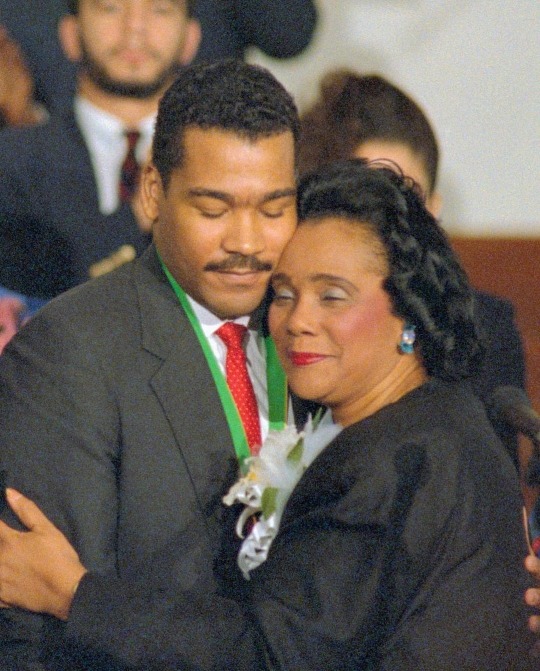


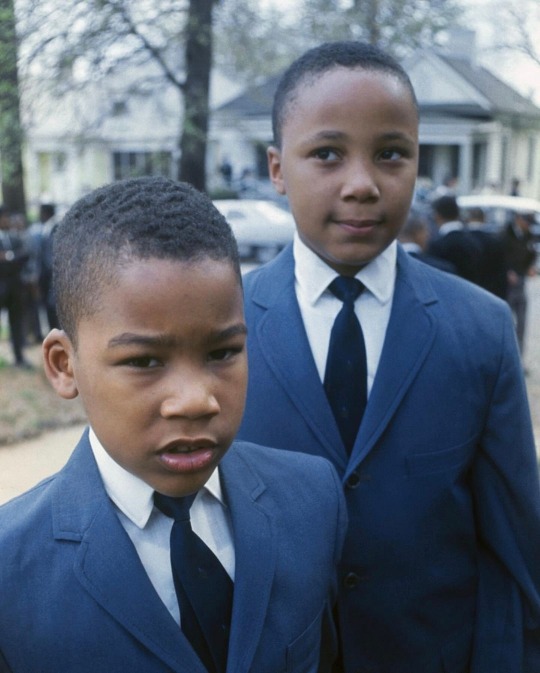

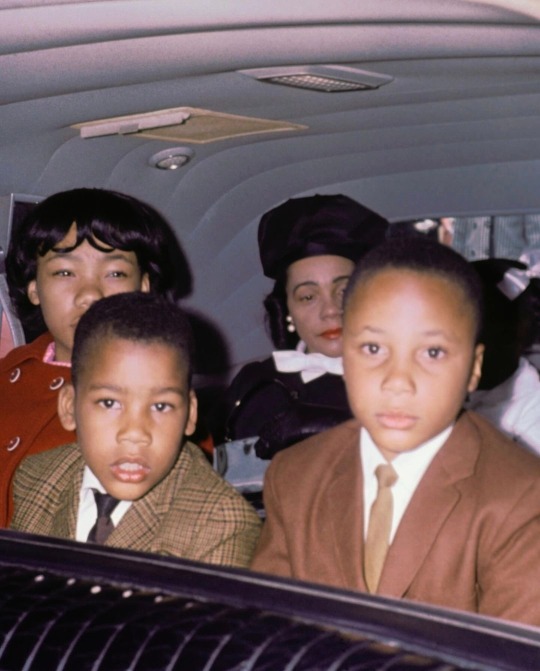


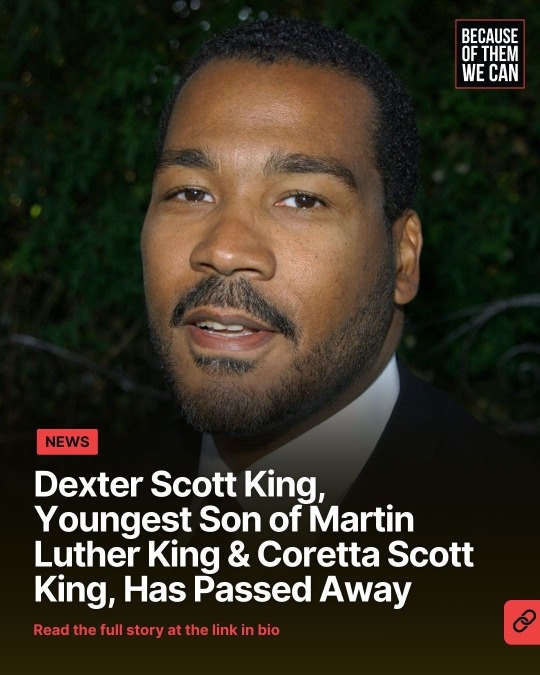
becauseofthem:
Dexter Scott King, youngest son of Dr. Martin Luther King, Jr. and Coretta Scott King, has passed away at age 62 after battling with prostate cancer. We are extending our deepest sympathies to the entire King family. His sister, Rev. Dr. Bernice A. King, released a statement on behalf of the family, “Words cannot express the heartbreak I feel from losing another sibling. I’m praying for strength to get through this very difficult time,” said Rev. King. \n\nBorn January 30, 1961, in Atlanta, Georgia, Dexter Scott King was named after the historic Dexter Avenue Baptist Church in Montgomery, Alabama, where his father first pastored, Fox 5 Atlanta reports. The third child and youngest son of Dr. Martin Luther King Jr. and Coretta Scott King, he was only seven years old when his father was assassinated. \n\nHe grew up in Atlanta and attended the Ebenezer Baptist Church, where his grandfather served as pastor, going on to graduate from Frederick Douglas High School, where he played football. Like his father, he went on to attend Morehouse College and continue the legacy of civil rights in his family, devoting his life to their work and protecting the family’s intellectual property. Dexter was known to have an uncanny resemblance to his father, portraying him in the 2002 television movie, “The Rosa Parks Story.” He initially pursued a career in acting and had a passion for the arts. But he held off his acting pursuits to pursue his duty to the King family legacy, specializing in intellectual property law and ensuring the management and licensing of the King Estate was well intact. He served as Chairman of The King Center and President of the King Estate, where he valiantly protected the legacy of his parents and family. To learn more about the life and legacy of Dexter Scott King, 🔗 click the link in our bio on our profile 👉🏾@becauseofthem. #becauseofthemwecan #homeofblackexcellence #dexterscottking 👉🏾Follow @becauseofthem to join our community for more positive and uplifting Black stories, news, and more ✨
2 notes
·
View notes
Text
A proud history reblog
In a handwritten letter to himself, dated December 13, 1990, Specialist Alan Rogers, a twenty-three-year-old African-American chaplain’s assistant, grappled with the issue of fear as he prepared for his first combat tour.
Rogers was an unusually soft-spoken and cerebral enlistee—voted “most intellectual” in high-school class, Rogers went on to a distinguished military career. After earning two Kuwait Liberation medals with the 8th Battalion, 43rd Air Defense Artillery, which provided Patriot-missile support against Saddam Hussein’s Soviet-made Scuds.
He returned home and on a R.O.T.C. scholarship at the University of Florida, earned his bachelor’s degree in Religion.
He pursued a second master’s in policy management at Georgetown, part of an élite Defense Department internship program offered to twenty captains across the services. It included an assignment to the Pentagon—in Rogers’s case, as a special assistant to the Deputy Secretary of Defense, Gordon England. [Then], he worked at the Pentagon as the lead biometrics officer in Army Intelligence — “the stuff that you see on ‘C.S.I.: Miami,’ ” as one of his friends put it.
After he began his third tour in Iraq, he took note of the weather in Baghdad, which wasn’t so different from Florida’s, and declared, “This is an ideal time to be here.”
Rogers was sitting in the right rear seat of an armored Humvee, in East Baghdad, on a routine morning patrol, as it passed a guardrail concealing an I.E.D. The force of the explosion blew straight through the vehicle, knocking an Iraqi interpreter, in the left seat, into the street. The interpreter and an American gunner who was standing beside Rogers in the Humvee were injured. Rogers died instantly. He was forty.
An obituary in the Gainesville Sun mentioned that Rogers was divorced and a Baptist minister - news to many of his friends at the Washington, D.C. chapter of American Veterans for Equal Rights (AVER) formerly Gay, Lesbian, and Bisexual Veterans of America. The minister claim was accurate — Rogers’s troops on Team Stiletto called him the Preacher, on account of his frequent sermon like pep talks, Before his burial at Arlington National Cemetery, a “homegoing service” was held for his casket at the Ebenezer Baptist Church in Starke, Florida, where he was ordained in 1995. Governor Charlie Crist ordered the flags at the statehouse flown at half-mast for the occasion.
The mention of a divorce was not accurate; it may have been a story some acquaintances passed on to explain why Rogers did not have a wife or a girlfriend. “We made a statement that he was married to the Army,” one longtime friend told.
As word of Rogers’s death spread in the gay community, some began to wonder if he might not qualify as the first known gay casualty of the Iraq war. Opponents of the military’s policy, noting his impeccable résumé, and his work with the Deputy Secretary of Defense, saw in Rogers a transformative figure and began soliciting media coverage...
READ ARTICLE FOR THE FULL STORY
5 notes
·
View notes
Text
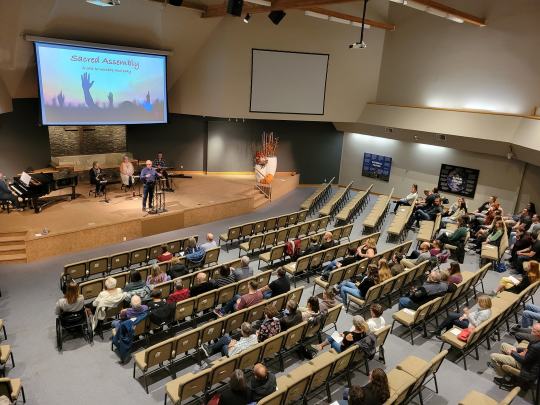
Baptist General Conference of Canada
Independent Baptist Church of America
Image from: Ebenezer Baptist Church, Saskatoon, Saskatchewan (BGCC)
4 notes
·
View notes
Text
Martin Luther King, Jr. on Service
If you want to be important, wonderful. If you want to be great, wonderful. But recognize that he who is greatest among you shall be your servant. That's a new definition of greatness... by giving that definition of greatness, it means that everybody can be great, because everybody can serve. You don't have to have a college degree to serve. You don't have to make your subject and your verb agree to serve. You don't have to know about Plato and Aristotle to serve. You don't have to know Einstein's theory of relativity to serve. You don't have to know the second theory of thermodynamics in physics to serve. You only need a heart full of grace, a soul generated by love. And you can be that servant.
from a sermon delivered by the Rev. Martin Luther King, Jr. at the historic Ebenezer Baptist Church in Atlanta, Georgia, two months before he was assassinated.
2 notes
·
View notes
Text

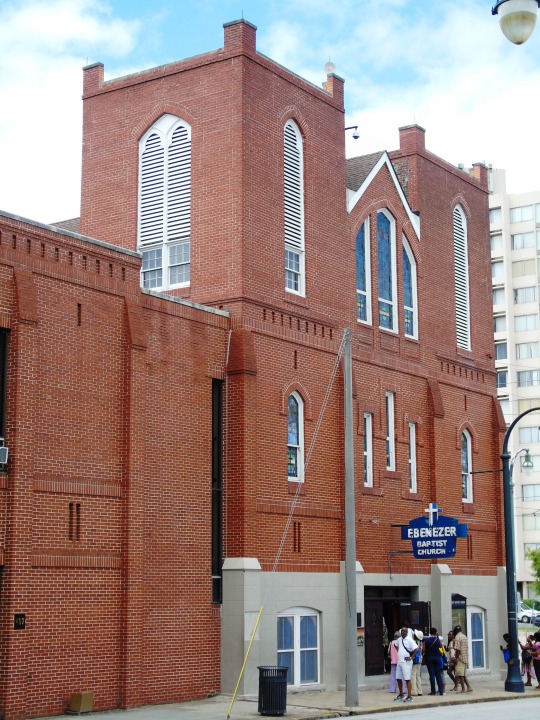






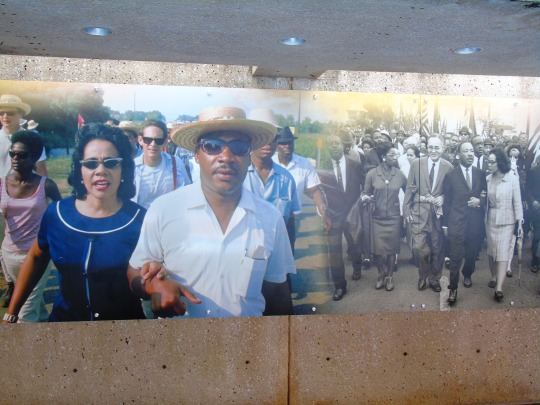

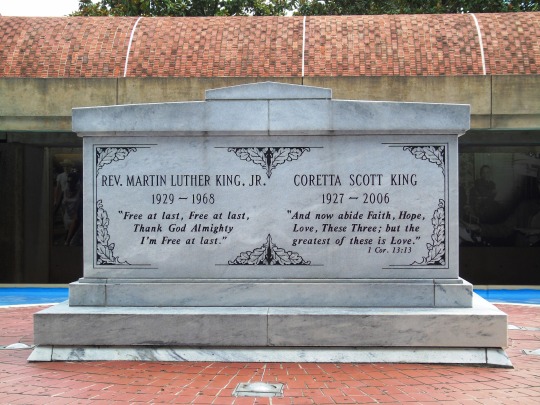

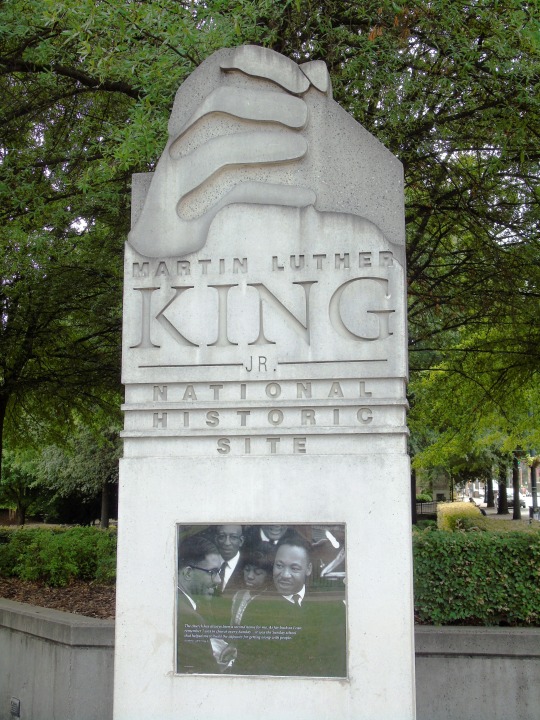



Martin Luther King Jr. was buried in Atlanta on April 9, 1968.
#Martin Luther King Jr. National Historical Park#Atlanta#Georgia#travel#USA#Martin Luther King Jr.#burial#9. April 1968#anniversary#US history#landmark#Martin Luther King Jr. Center for Nonviolent Social Change#architecture#Historic Ebenezer Baptist Church#civil rights movement#original photography#vacation#summer 2016#cityscape#free admission#tourist attraction
6 notes
·
View notes
Text


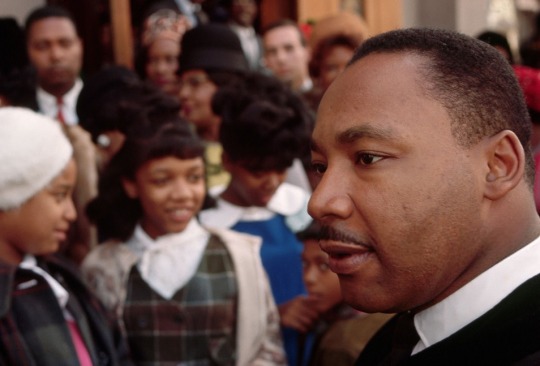
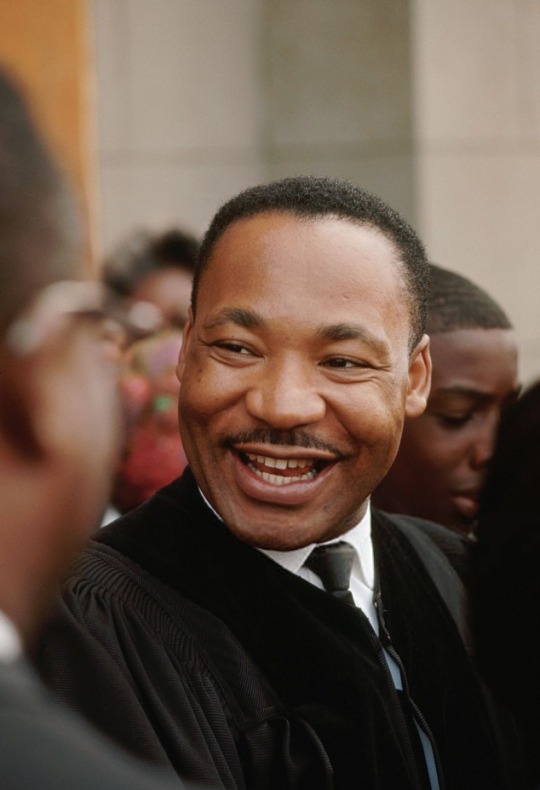

Reverend Martin Luther King Jr. with his son Martin Luther King III as he greets parishioners at Ebenezer Baptist Church in Atlanta on November 8, 1964.
Photos by Flip Schulke
96 notes
·
View notes
Text
...
“The Republican base is asking for very, very little,” he told me this week. “For all the stories we have about, like, the election deniers, from March of last year until now, their demands have basically been, like, ‘Please do something about the economy, please do something about immigration, please don’t let dudes participate in girls sports, and please do something about crime.’ ” When it came to independents, he went on, “It’s, like, ‘Please do something about inflation, please do something about crime, we’re pretty much with you on the girls-sports thing, just don’t be a dick about it.’ ”
He sounded a little gleeful. “It’s almost like we’ve fallen ass-backwards into the Contract with America,” he said, referring to the 1994 conservative agenda that fuelled the Republican takeover of Congress that year and elevated Newt Gingrich to House Speaker. “Certainly not because of any cunning or wit or foresight on our part. Let me assure you, it has not been because of the searing intellect of Republican leadership.”
Democrats were eager this week to point out how many seats the party in control of the White House typically loses in a midterm election—Barack Obama, the greatest politician the Party has produced in a generation, lost sixty-three seats in the House of Representatives in his first midterm. But many of the Republicans I spoke with saw this year as distinct. The pollster in Pennsylvania said that in 2010, “Obama got punished for overreach. That’s not this. This is incompetence.” When I asked the Republican consultant what the voters coming home to the G.O.P. in October wanted, he said, “Stop Biden. That’s it.”
Some elections are not complicated at all. As these Republican strategists saw it, their candidates did not get past unpopular positions on abortion with a tactical masterstroke, they simply absorbed the electoral hit and moved on. The economy is not good, and the President is both a Democrat and unpopular. If you looked only at those factors you might expect a result not unlike the Republican wave that these G.O.P. insiders have predicted. Maybe the race was simple enough that it could be sketched on a napkin.
On Wednesday afternoon, I spoke with a leading Republican political consultant about the Senate campaign in Georgia. That race is strategically significant for both parties, but it has a special symbolic importance for Democrats. The incumbent, Raphael Warnock, who for many years has occupied Martin Luther King, Jr.,’s pulpit at Ebenezer Baptist Church, in Atlanta, is seen as a potential national leader of the Democratic Party—and he may still lose to a scandal-ridden ex-football star, the Republican Herschel Walker. The Republican consultant told me that Warnock’s prospects were even bleaker than many recent public polls suggest. “There isn’t a single private poll in America that has Herschel Walker anything but ahead,” the Republican consultant told me. “Not one.”
The consensus among a number of G.O.P. pollsters and operatives I spoke to this week is that in the Senate races that are thought to be competitive, Republican candidates are heading for a clean sweep: Mehmet Oz will beat John Fetterman in Pennsylvania, and not just by a point or two; Adam Laxalt looks pretty certain to defeat the incumbent Democratic senator Catherine Cortez Masto in Nevada; even less regarded candidates such as Blake Masters in Arizona will be carried into office by a predicted wave. “He won’t deserve it, but I think at this point he falls into a Senate seat,” one Republican strategist told me. To these Republican insiders, certain high-profile races in which G.O.P. candidates were already favored now look like potential blowouts—Kari Lake’s campaign for governor in Arizona, J. D. Vance’s for Senate in Ohio. And some races that seemed out of reach, such as the Senate campaign, in New Hampshire, of the election denier Don Bolduc, now look like possible wins. The word that kept coming up in these conversations was “bloodbath.”
My interest in talking with Republican consultants and pollsters, those with their hands in many races around the country, was not only to collect predictions but to hear the G.O.P.’s story of the election. (I let them speak anonymously, and spoke with some of their Democratic peers, too, in order to provide a check on their accounts.) I wanted to know what they thought earlier polls had missed, and how a race that had seemed like a tossup for much of the year could turn into a Republican rout.
One thing was obvious in these conversations: many of these professionals had spent much of the summer working to manage the abortion issue, which became the election’s chaotic element after the Supreme Court’s decision in Dobbs v. Jackson Women’s Health Organization, which overturned Roe v. Wade, in June. It supplied a burst of Democratic support and fury, but also changed polling in interesting ways. “What happened post-Dobbs was that progressives started picking up the phone at nineteen-nineties rates,” the Republican strategist told me. “Answering a political poll itself became a kind of expression of political identity.”
This Republican said that he and a colleague had examined polls in which they had access to individual voter data and concluded that as much as sixty per cent of Democratic poll respondents this summer were so-called super voters, those who vote in every single election, even though such voters normally compose about a third of the general electorate in each party. (He found no such effect among Republicans.) “This created an informational doom loop, where Democratic candidates get told, You should talk about January 6th, democracy being on the ballot, trans rights,’ ” he said, “because their primary super voters are picking up the phone and telling them this is what they care about.”
Still, crafting a winning response to the abortion issue was a fixation among Republicans. A pollster working in many races across the country said, “I had candidates who wanted to know the same thing, week after week, ‘How do we answer this abortion thing? They’re beating me up on it.’ ” The pollster went on, “And what they figured out is, we don’t have a good answer. It is what it is.”
In the end, Republicans didn’t find a way through the political fact that many of the voters they wanted to win were against them on abortion so much as wait it out. As a Democratic strategist pointed out to me, a flood of funding after the Supreme Court decision allowed Democratic campaigns to put ads on television “much, much earlier” in swing states. This created a unique situation, he went on, in which Democrats were disproportionately tuned in to politics, the Democratic base was overrepresented in polls, and swing voters were overwhelmingly seeing Democratic ads. “I think that’s what creates that blue mirage during the summer,” he said.
At the same time, the polls were likely underrepresenting certain segments of the electorate. In recent years, more educated voters, especially white women, have moved to the Democrats, and less educated ones, of all races and especially men, toward the Republicans. When it comes to polling, these shifts have created an imbalance, in which one of the most visible groups in politics, and one especially energized by the Dobbs decision, had shifted toward Democrats, and one of the least visible had shifted toward Republicans. “The fastest-moving portion of the electorate is Hispanic men, and the second-fastest-moving portion of the electorate is Black men,” the Republican consultant told me. You want to get them on the phone? “Good fucking luck.”
A Democratic pollster told me, “Arizona is, I think, like ground zero for that trend. I think you’re seeing a lot of Hispanic drift toward Laxalt.” This Democrat also noted that Stacey Abrams, the Democratic gubernatorial nominee in Georgia, is underperforming among Black men, and thought that Abrams’s opponent, Republican Governor Brian Kemp, “is going to do a decent job winning Black voters compared to his 2018 performance.”
If Republicans couldn’t wait to get away from the major social issues, the Democrats continued to focus on them. Speaking about the defection of Hispanics to the G.O.P. in Nevada, the Republican strategist told me, “The reason that Democrats have fucked this up is that they won’t stop talking about abortion. And the reason that they screwed it up with Blacks is they won’t stop talking about abortion. . . . It’s like they’re a two-issue party. It’s this and Trump. They can’t stop. I don’t think they have anything else.”
The evolving Democratic coalition has made the party at once more prosperous and more progressive, a trick that long seemed difficult to pull off. But it has also exposed the party to certain vulnerabilities, especially among working-class voters. Across the country, Republicans have tended to emphasize a simple story about inflation—that the White House had been inattentive to its rise and its impact on ordinary Americans. As the Republican strategist put it to me, “Inflation is the big federal story, and a lot of blame belongs on the White House, because the White House just wished this would go away instead of saying, ‘We know it’s real, we know it’s a problem, it’s happening everywhere, we’re going to do everything to fix it but we can’t fix it immediately.’ ”
In certain politically competitive parts of the country, especially the booming Sun Belt states of Arizona, Florida, Georgia, and Texas, Republican governors could also make some policy gestures to back up the way they spoke about inflation. In July, Kemp, the governor of Georgia, extended a statewide gas-tax holiday. In August, he committed to spend two billion dollars in state-budget surplus on property-tax and income-tax rebates if reëlected. The next week, he said that $1.2 billion in federal COVID aid would be converted to three-hundred-and-fifty-dollar checks for low-income Georgians. In the closing statement of his final debate against Abrams, Kemp celebrated what he called the lowest unemployment rate and the most people ever working in the history of Georgia.
The gubernatorial campaigns of Ron DeSantis, in Florida, Greg Abbott, in Texas, and Kari Lake, in Arizona, have similarly emphasized this contrast—between the sunny G.O.P.-managed economy at home and the darkening, inflation-related clouds emanating from Joe Biden’s Washington. If voters felt economically stressed, Kemp said during his final debate, “the problem is, [wages are] not going up fast enough to keep up with Joe Biden’s inflation.”
It probably isn’t an accident that the next generation of MAGA stars has come from growing Southern states. As the Democratic pollster put it to me ruefully, “Being a governor of a Sun Belt state is awesome, because your economy is growing so fast, because you don’t have to raise taxes, and tax revenue just goes up, and then you get to do popular economic stuff.”
Republicans also moved to capitalize on the flailing economy with declarations—at campaign stops, in television ads, on right-wing media—that the country was descending into chaos. As the Democratic consultant Stanley Greenberg wrote this week, Democratic candidates “faced a barrage of ads on crime starting in September and early October, a barrage aided by Fox News dramatically increasing its crime reporting.” This offensive seems to have worked: when Greenberg asked voters what they most feared about Democratic control of Congress, their top pick was “crime and homelessness out of control in cities and police coming under attack,” which ran thirteen points ahead of concerns about illegal immigration.
Even if Democrats had wanted to make their own pivot to economic issues, their window to do so, by the early fall, was closing. The inflation index in September was much worse than it had been during the preceding months, and quite quickly it was difficult for Democrats to find much to brag about economically. By October, the basic daily experience of the race, for the Republican consultants I spoke with, had changed. “Post-Dobbs, Republicans stopped taking polls,” a Republican pollster told me. “In October, my sampling guys came back and told me, ‘Republicans are taking polls again. Response rates are through the roof.’ ”
By then, according to the insiders, Democrats were too trapped in issues—abortion and the threat to democracy—that appealed to their most devoted and best-educated supporters, and had not done enough to reassure voters that they were addressing material concerns. The Republican pollster, who has been regularly surveying Pennsylvania, told me that, when it came to the Democratic focus on abortion, “there just doesn’t seem to be any specificity. You’d want to do it with high-education, high-income supporters. It’s, like, no, they’re running on abortion constantly in, like, Scranton.”
Back in the summer, I’d spoken with the Republican strategist, who then predicted that the Dobbs wave would be ephemeral. “The Republican base is asking for very, very little,” he told me this week. “For all the stories we have about, like, the election deniers, from March of last year until now, their demands have basically been, like, ‘Please do something about the economy, please do something about immigration, please don’t let dudes participate in girls sports, and please do something about crime.’ ” When it came to independents, he went on, “It’s, like, ‘Please do something about inflation, please do something about crime, we’re pretty much with you on the girls-sports thing, just don’t be a dick about it.’ ”
He sounded a little gleeful. “It’s almost like we’ve fallen ass-backwards into the Contract with America,” he said, referring to the 1994 conservative agenda that fuelled the Republican takeover of Congress that year and elevated Newt Gingrich to House Speaker. “Certainly not because of any cunning or wit or foresight on our part. Let me assure you, it has not been because of the searing intellect of Republican leadership.”
Democrats were eager this week to point out how many seats the party in control of the White House typically loses in a midterm election—Barack Obama, the greatest politician the Party has produced in a generation, lost sixty-three seats in the House of Representatives in his first midterm. But many of the Republicans I spoke with saw this year as distinct. The pollster in Pennsylvania said that in 2010, “Obama got punished for overreach. That’s not this. This is incompetence.” When I asked the Republican consultant what the voters coming home to the G.O.P. in October wanted, he said, “Stop Biden. That’s it.”
Some elections are not complicated at all. As these Republican strategists saw it, their candidates did not get past unpopular positions on abortion with a tactical masterstroke, they simply absorbed the electoral hit and moved on. The economy is not good, and the President is both a Democrat and unpopular. If you looked only at those factors you might expect a result not unlike the Republican wave that these G.O.P. insiders have predicted. Maybe the race was simple enough that it could be sketched on a napkin.
“I can show you the trajectory of all our races,” the Republican pollster told me. “We took a benchmark in July—O.K., this is going to be harder than we thought. And it looks like a ‘V.’ We went straight down. And then once we finally got to October, we have enough money, the electorate becomes more fully engaged, and then the other side of the ‘V’ is straight back up. I can show you the same story in probably twenty-five races.” ♦
12 notes
·
View notes